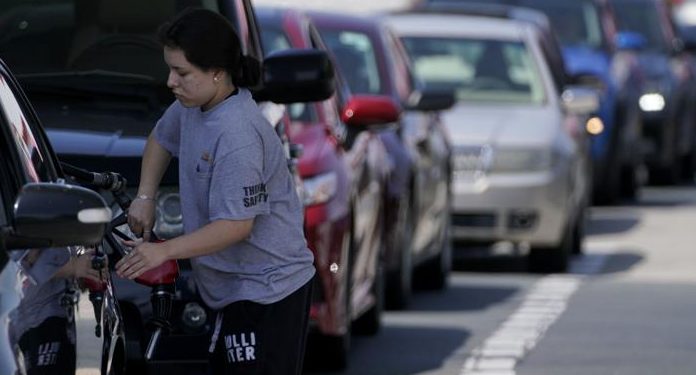(Bethany Blankley, The Center Square) Gas stations in multiple U.S. states began to run out of gas after Georgia-based Colonial Pipeline, the nation’s largest pipeline, fell victim to a cyberattack over the weekend.
Residents living in Florida, Georgia, South Carolina, North Carolina and Virginia have already reported running out of fuel and some governors have declared a state of emergency.
By noon Monday, GasBuddy reported that roughly 7% of gas stations in Virginia had run out of gas, over 2% of North Carolina stations, 1.5% of Georgia and Florida stations, and 0.5% of South Carolina stations, and shortages are only expected to increase.
Drivers waited in long lines to fill their gas tanks in Florida. Agriculture and Consumer Services Commissioner Nikki Fried urged people not to buy or hoard gas in a video statement.
In Atlanta, drivers posted pictures on social media of gas stations they’d gone to that were empty.
North Carolina Gov. Roy Cooper issued a state of emergency Monday, temporarily suspending all fuel regulations in an effort to ensure adequate supply throughout the state. Residents in different parts of the state told local news channels of gas stations that had already run out of gas.
South Carolina residents identified which stations were out of gas to WPDE News.
“What we’re understanding from our tankers is the terminals where they get gas, aren’t getting the gas which is then not able to give to our tankers who can’t give it to us because they don’t have it,” Angel Lodice, a representative of a Circle K gas station in Myrtle Beach, told WPDE News.
Colonial Pipeline doesn’t expect to be fully operational before the weekend.
The nation’s largest pipeline has the capacity to move 2.7 million barrels a day of refined petroleum products from refineries in the Gulf Coast (PADD 3) to the East Coast (PADD 1). It stretches from Texas to New Jersey, providing the eastern seaboard with roughly half of their needed fuel, including gasoline, jet fuel and heating oil.
“Areas including Mississippi, Tennessee, and the East Coast from Georgia into Delaware are most likely to experience limited fuel availability and price increases, as early as this week. These states may see prices increase three to seven cents this week,” a spokesperson for the company said.
The East Coast accounts for roughly one-third of America’s total petroleum product consumption.
The Baker Institute explains the economic ramifications for the region – and the U.S. – the longer the pipeline remains offline. In an op-ed published by Forbes, it notes that the costs will likely go up along the East Coast and down in the Gulf Coast because of over- and under- supply and demand.
On the East Coast, fuel storage will be depleted and prices will go up.
“Given the relative lack of local refining capacity, prices on the East Coast will increase due to undersupply. Imports of refined products into East Coast ports could help, but the Jones Act precludes this supply from being fully sourced domestically; so, it would need to be imported from overseas,” the report states.
Along the Gulf Coast, an oversupply will push down prices. If refiners are unable to move their products, storage will be used to capacity and output may be reduced, creating an oversupply and pushing down prices.
“Of course, the international market can also provide a relief valve for excess Gulf Coast supplies, but the extent to which this happens will depend on price and logistical considerations,” the report states.
The Gulf Coast region exports roughly 7.2 million barrels per day of crude oil and petroleum products annually to international buyers.
President Joe Biden is being regularly briefed on the pipeline incident, White House press secretary Jen Psaki said.
“We are monitoring supply shortages in parts of the southeast and are evaluating every action the administration can take to mitigate the impact as much as possible,” she said. “The president has directed agencies across the federal government to bring their resources to bear to help alleviate shortages where they may occur.”…Original Source…

